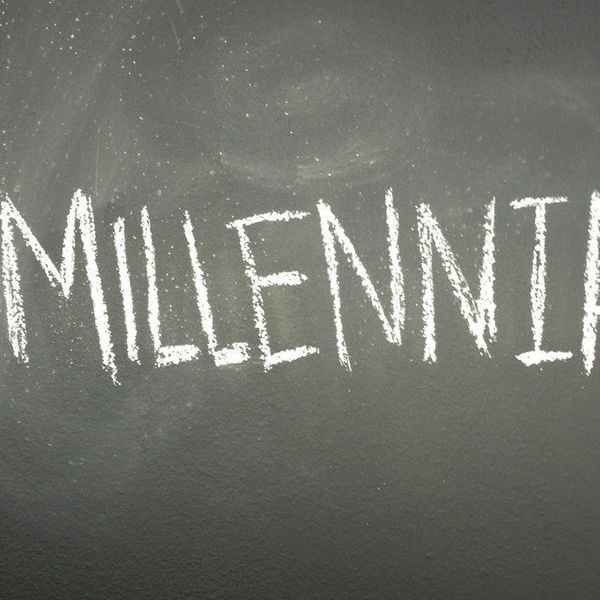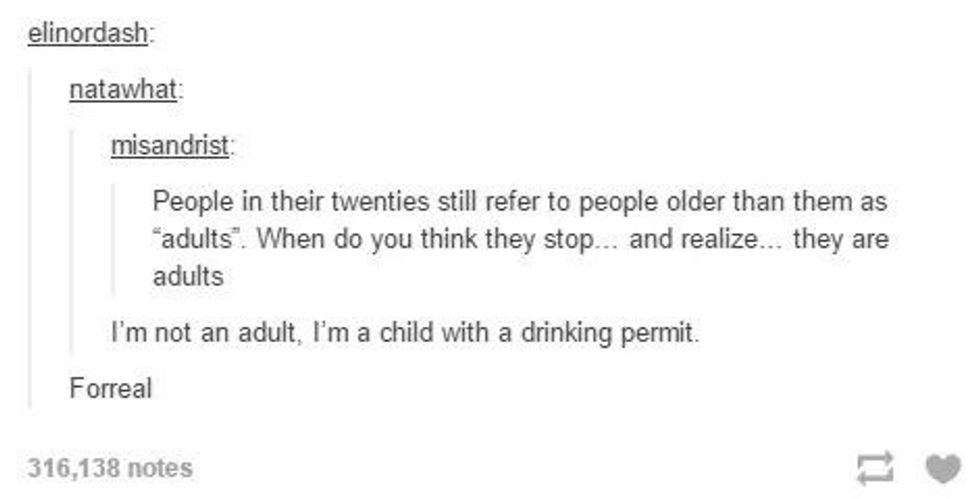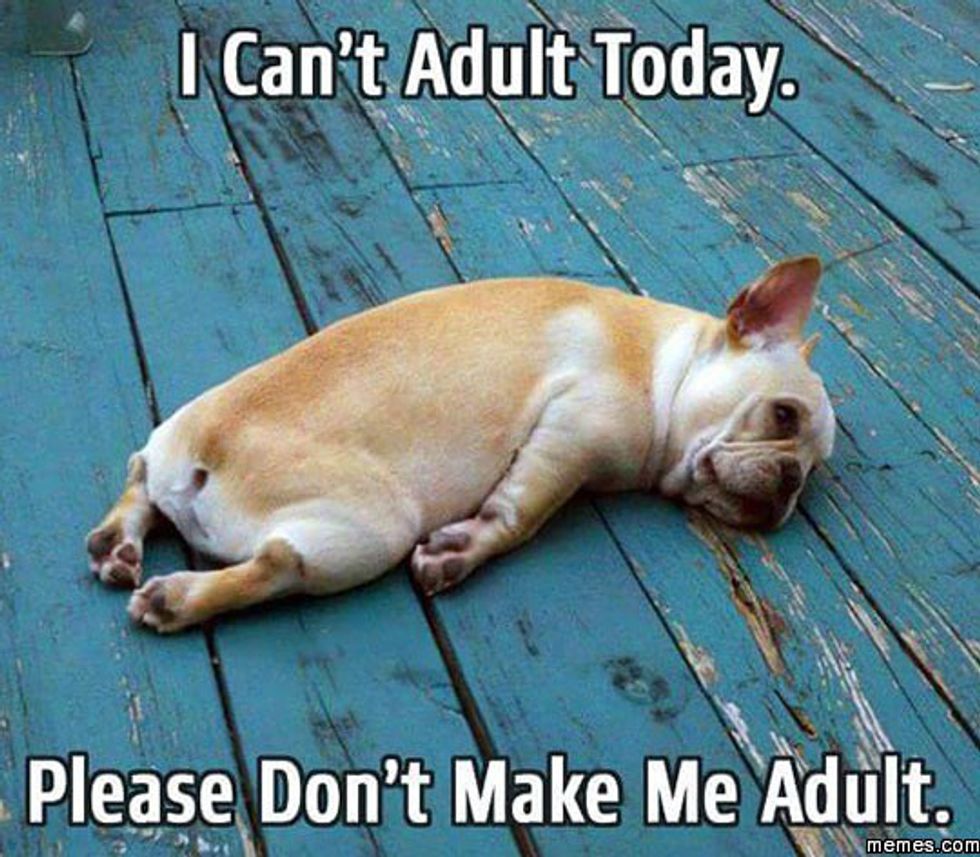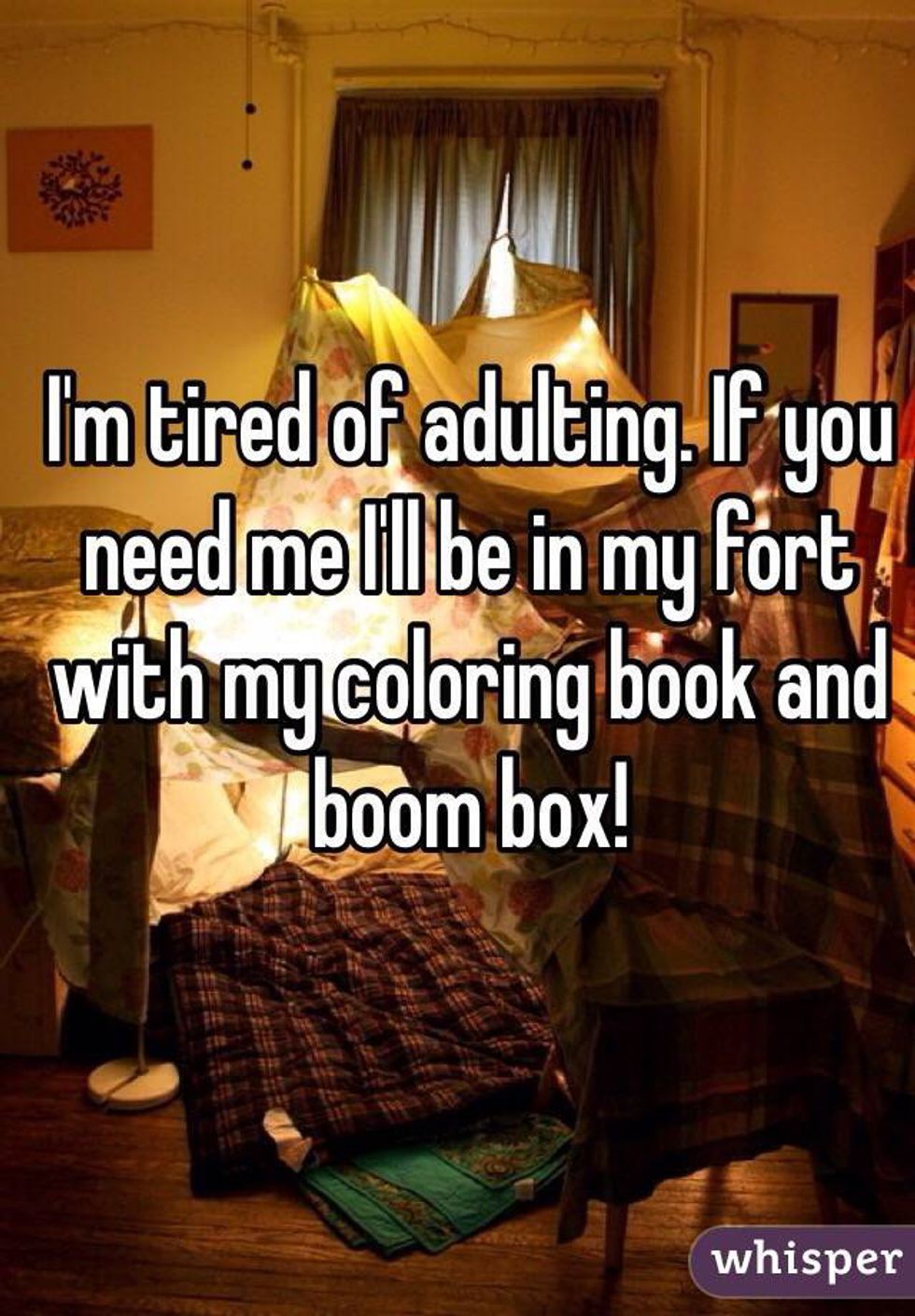Scrolling through my Facebook news feed this morning, I found this, and paused, because it's true -- or at least, mostly true. And, apparently, over 300 thousand people agree with me.
“Adulting: acting like an adult or engaging in activities usually associated with adulthood – often responsible or boring tasks.” - Mignon Fogarty
I'm in college and a legal adult. Yet the tasks of adulthood -- getting a job, finding a home, becoming responsible for myself -- seem scary. Some people, like Sophie Lucido Johnson, cope with it by going through the motions of what we know as "adulthood:" keeping fresh flowers, having a glass lemonade pitcher. Others reward themselves with the comforts of childhood at the end of a long day: playing board games, sipping juice boxes.
Why is "adulting" so difficult for us? John Beckett attributes it to our Baby Boomer parents and mentors telling us that we could be anything we wanted, when really they meant that we could be anything we wanted within their constraints. "Millennials heard what we told them over and over again and assumed it was true," he says, "And then when it came time to be an adult, they didn’t like what they saw." He concludes by saying, "Millennials and others who don’t want to adult aren’t being immature. They just don’t like the mainstream society’s definition of 'adult.' And sooner or later, they’re going to change it."
To a point, he may be right. Maybe the reason my friends and I don't want to "adult" is simply because the reality of adulthood is something we would rather change than conform to. Perhaps we will change it. Already, coloring for adults is becoming acceptable, with the rise coloring books aimed at an older demographic -- and I welcome it. Yet I don't think that this is the whole story.
I think that a large part of it -- and why we as millennials are hard for Baby Boomers and Gen-Xers to understand --has to do with the changing world we live in. Baby Boomers had a checklist of success: you got a good job, married, bought a house, and so on. These milestones are harder for millennials to check off from their to-do lists.
The foundation to an adult life, as we have long been told, is getting a good job. In the days of our parents and grandparents, you could graduate high school without the need for a higher degree to get a decent job. High school taught the skills you needed to make a living for yourself. Classes like wood shop and auto shop were offered so that students could learn carpentry and mechanics. There were classes that taught secretarial work, typing and running old-fashioned copying machines. Home Economics taught about child rearing, cooking and sewing. While these classes had their problems, they were still useful. They taught skills you would use once you graduated.
Today's high schools don't do that, and, truly, they should. In my four years of high school, every class I took had one goal, and it wasn't to teach me how to live once I graduated; it was to get me into college. High school didn't give me life survival skills, it gave me the skills to fool an English professor into thinking I'm an English major. Yet the things that will help me live on my own weren't -- and still aren't -- taught. This has been recognized, and some people are calling for a revival of home ec. so that high school students can learn basic financial literacy -- such as balancing a checkbook and doing taxes -- and life skills like cooking, good nutrition, sewing and basic home repair.
So not only do modern high school classes not teach you how to live post-graduation, they aren't enough to get you a job these days; or at least not one which will move you to the next point on your "adulting" check list. My friends who haven't attended college, or who are working and attending community colleges, are working in grocery stores and fast food jobs that pay minimum wage. They all still live with their parents, lack serious relationships, and few of them know how to cook. Most of them don't drive.
Having a high school diploma lets them get jobs in meat departments at Safeway, or as cart boys at Target. It doesn't get them a job as a secretary; it doesn't get them a factory job that can support them and their future families. One of my friends spent months trying to get a job somewhere -- anywhere. He applied for every fast food and grocery chain in his area. It took him two or three months just to get a cashier job at his local Krogers: not something that let him move out, but something that at least gave him money to spend and save.
It's more than clear that minimum wage isn't enough to live on. This article describes the life of the Riveras, a husband and wife who make minimum wage working full time, but who still need food stamps. Millennials have seen examples of lives such as the Riveras' for years, in articles and news segments shared through traditional and social media. The Occupy protests, the support for Bernie Sanders: these are symptoms of a generation who know that they are going to have difficulties getting a job, who know that minimum wage is not enough, who are terrified of being adults, because that isn't a world we have been equipped to live in.
Housing is out of our price range, we can't pay our own way through college, health care is still prohibitively expensive even with insurance, and we know that student debt is going to crush us before we can find the job we were told would pay for all of that other stuff. To get that job, we need higher education, but higher education is expensive. College graduates and their parents are 10 times more in debt today than in 1994. The average amount owed by a new graduate is 35 thousand dollars, more than the average new car. When you consider that interest will have to be paid as well, one has to ask, is it truly worth it?
Additionally, millennials are being paid even less today than a decade ago, and we aren't reaching the median wage level until we're 30. Even when we jump through the hoops that are being asked of us, getting the degrees that we were told were necessary, we aren't being hired or paid what we were led to believe. Even college graduates send out dozens of applications, only to get one or two responses. And then -- as if anything else could get worse -- those responses are mostly negative, since more experienced workers are taking entry level jobs. Entry-level is no longer entry-level; to get any kind of paying job, you need experience already, typically in the form of unpaid internships, which most can't afford to pursue.
Millennials know these things: all of the things that are apparently necessary to be an adult are more difficult for us today than they were decades ago. We're faced with a terrifying world where it seems like there are no jobs and a home of our own is too expensive for the little pay we are given. For those who want families, it becomes a question of when children can feasibly be supported and when the parents will be financially secure. Unfortunately, that age seems to be getting higher and higher.
We consider ourselves children because that is what we are; we live at home because we can't afford otherwise, working jobs that don't pay much more than spending money. And not because we choose to, but because that is all that is available to us. The responsibility that adulthood signifies isn't ours when we cannot take it on, and so we cling to the familiar. Why wouldn't we want to sit in our blanket forts with our coloring books and boomboxes, remembering a time when the economy wasn't terrible and we actually had hope for for our futures? Especially when trying to "adult" is a constant reminder that we face higher and higher barriers to developing our own lives. So, please stop calling us lazy, because actually, no, we can't "adult."



























